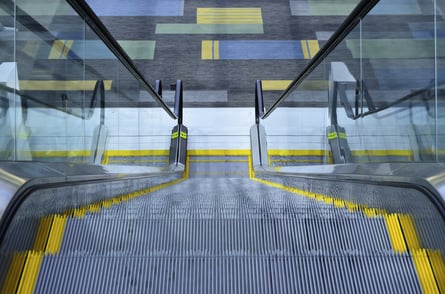
On a recent morning I made my usual heading-to-work mad dash onto the escalator from the street to the subway station turnstile platform. Joining the throng, I stepped into the "left lane" where I could walk up the moving stairs and let the unhurried folks in the right lane stand and be carried to the top, gaining me at least four seconds!
Well, that’s how it usually works. This day there seemed to be a traffic jam on the escalator. As I started the ascent, I heard "He's falling. I can't hold him up! He's falling!" And there ahead of me on the right, was an elderly man leaning way back, his feet slowly getting further and further in front of him as the mechanical steps advanced, a woman behind him trying to hold his weight up, while the man behind her tried to hold her up, with everyone behind them on the verge of cascading like dominoes under each other's weight.
A few more of us moved into place to help the elderly man, who seemed unable to shift his feet—one of them missing a shoe at this point—back under him on his own. I tried pulling him up from in front by one shoulder, encouraging him to stand and take the weight off the woman behind him, worrying that I might tear his coat or even hurt him. Meanwhile his body continued to move slowly backward to nearly horizontal and more commuters joined in trying to lift him back up from behind, lest he cause an avalanche of bodies into the street below.
Finally, we reached the top where the escalator leveled out, and the crowd managed to quickly and gently let the man down on his bottom, then help him onto his feet just in time for him to step off the moving stairway with unsteady, mincing steps. He kept on repeating that he was okay, he just hadn’t been able to right his body and stand up.
A frail petite woman nearby, who I realized was his wife, had another focus. “Where is his shoe? Someone get his shoe!” she kept saying. A frustrated passerby said to her "Next time take the elevator!" to which she replied defensively "We didn't know this was going to happen."
The woman who had done the heavy lifting was out of breath, nursing an arm sore from the effort of propping the man up, visibly shaken. "I need to sit down," she said, heading off to the nearest bench.
And in moments we were all suddenly back to our morning travel routine, racing to catch the next train.
It was a perfect picture of the way New Yorkers can jump in to be helpful and then, once we’re sure the crisis is over, go right back to our busy schedules. Time is our master. And while we might forget that momentarily in an emergency, its rule will always prevail.
What would happen, I wonder, if we slowed just enough to be mindful of those around us, just enough to help an elderly man up the escalator before he starts to fall? I will make an effort to be more mindful of those around me. But I expect that I will gradually slip back into my usual rush and focus on my own needs, until the next emergency creates a reason for all of us to help someone in need. Maybe that’s the silver lining of the unexpected crisis—creating community where we forget to do it on our own. At least for a few brief moments.
[wpvideo 3JaLdYpY]




Comments [0]
Click here to read/write comments